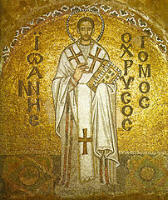
Life Of John Chrysostom by Frederic M. Perthes
IV
CALL TO THE CAPITOL
398
IN the spirit exhibited by the foregoing description Chrysostom had labored twelve years in Antioch; and, had it depended on his own pleasure, he would not have left his office in this city. He enjoyed the love of his church, general respect in the city, and the entire confidence of his bishop Flavian. He was not without influence upon the community as a whole, and a rich blessing proceeded from him to individual susceptible hearts. This is as much as a preacher of Christ may expect for himself upon earth.
But God had determined otherwise respecting him. He was to enter a greater sphere of action and cultivate a still more important field. Such a man was to be used, and was worthy of being led by God into another and less delightful school; I mean the school of suffering. He could endure the fire in which God is accustomed to purify and perfect, as gold in a furnace, the noblest spirits. Chrysostom was called to Constantinople as first bishop. He rose high, but whoever stands very high can fall very low. This John experienced.
I said, God had determined otherwise respecting him. But if we look merely at the manner in which he was removed from Antioch to the capital, the expression may seem unsuitable; for this call to the court came in a way altogether human. Eutropius, a favorite of the Emperor and his first minister, of whom we shall yet hear remarkable things, was the man who principally urged this call. For in passing through Antioch this man had repeatedly heard Chrysostom preach, and had been charmed with him. But it was only the beautiful way in which he spoke, it was only the eloquence, which pleased him; in the teaching, in the truth, Eutropius took no pleasure, and as little in the spirit, in the earnest, holy love, by which John was inspired. He thought: “the presbyter in Antioch is a fine orator, we must bring him into the capital.” The Emperor and his wife, to whom he proposed the matter, assented, and the city was very well satisfied, for Chrysostom had already won a name. But when it was ascertained that the church in Antioch was strongly attached to her pastor, and observed that a man of his spirit would hardly have any great inclination to be transferred to the residence of the court, they used craft and force,—to which, indeed, the great lords of the capital were much accustomed. Under some pretext he was led quietly from the city to a neighboring farm, where two messengers of the Emperor were waiting with a carriage, into which he was placed, and then, without regard to the wish and will of preacher or church, he was carried to Constantinople.
This evidently is all very human, and nothing is to be seen of God’s hand in it. But this, indeed, is not generally to be seen, not even where, as the result shows, it has surely been at work. The sale of Joseph and his removal into Egypt was altogether a human transaction; and yet Joseph was certainly right, when surveying the whole course of his life he said, “Ye thought evil against me, but God meant it unto good.” Six years after he became bishop of Constantinople, Chrysostom fell into the deepest suffering, and without being relieved therefrom, as Joseph, died; but his last word was, Praised be God for all!
Let us not, however, anticipate, but proceed with our narrative. Yet before we describe the labor of Chrysostom in the capital, we must become more familiar with the soil which he was there to cultivate.
Copyright ©1999-2023 Wildfire Fellowship, Inc all rights reserved

 Keep Site Running
Keep Site Running